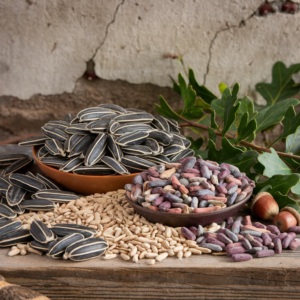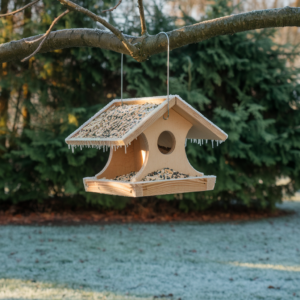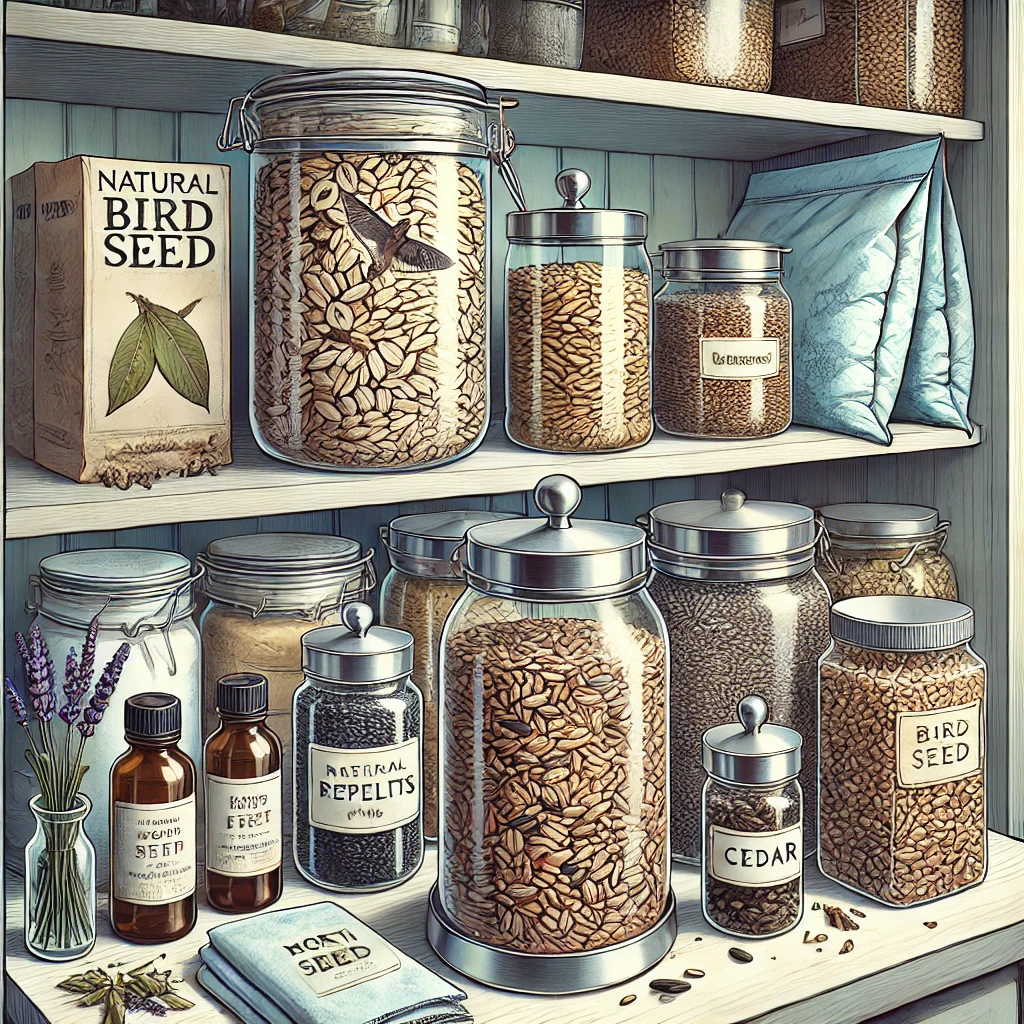Moths in bird seed are a common and frustrating issue for bird enthusiasts. These pests degrade the quality of the seed, deter birds from feeding, and spread to other food items in your home. Learning to naturally prevent moths in bird seed is essential for maintaining a healthy feeding environment and avoiding further infestations.

What Attracts Moths to Bird Seed?
Understanding what draws moths to birdseed is the first step in prevention. Moths are primarily attracted to grains and seeds because these provide an ideal environment for laying eggs and nurturing larvae. Typical storage environments, such as dark and quiet areas, encourage infestations.
Common Types of Moths in Bird Seed:
- Indian Meal Moths
- Pantry Moths
These pests can spoil your birdseed and spread to other dry goods in your home. Proper prevention techniques are crucial to keeping your bird seed moth-free.
You might also find our article on crosley bird guide helpful.
Why Moths in Bird Seed are a Concern
Moth infestations in bird seed can have several negative impacts, including:
- Damage to Seed Quality: Moth larvae consume the seed, creating clumps and webbing, which reduce its nutritional value.
- Spread of Infestation: Moths can migrate to other stored foods, causing a more widespread problem.
- Discouraged Bird Feeding: Moths and their larvae can deter birds from feeding, affecting the overall bird-watching experience.
Natural prevention methods are a safe and effective way to address this issue without harmful chemicals.
Purchasing Fresh and High-Quality Bird Seed
One of the easiest ways to prevent moths in bird seed is to ensure you are buying fresh, high-quality seed. Follow these tips:
- Buy from Trusted Sources: Purchase seed from suppliers known for fresh products with high turnover rates.
- Check Dates and Packaging: Always check the packaging date to ensure the seed is fresh. Avoid damaged or torn bags, which may already be contaminated.
- Buy in Smaller Quantities: Purchase only what you can use within a few months to minimize storage time and reduce the risk of infestations.
Keeping your seed fresh and properly stored is one of the most effective ways to prevent moths.
Proper Storage Solutions for Bird Seed
Proper storage is crucial in keeping moths away from your bird seed. Here are some key strategies:
- Airtight, Pest-Proof Containers: Store seed in metal, glass, or thick plastic containers with secure lids. Avoid thin plastic bags that moth larvae can chew through.
- Store in Cool, Dry Areas: Moisture and heat can promote moth breeding. Keep your seed in a cool, dry place, away from direct sunlight.
- Regular Cleaning of Storage Areas: Clean your areas frequently to remove seed dust and debris that may attract moths.
Cleaning Tip: Use water and vinegar to wipe down containers and storage areas. Vinegar naturally repels moths.
Freezing Bird Seed as a Preventive Measure

Freezing bird seeds is a simple, natural way to kill moth eggs and larvae without chemicals. Follow these steps:
- Pack Seed in Sealed Bags: Divide the seed into small portions and seal in airtight bags.
- Freeze for 48 Hours: Place the bags in the freezer for at least 48 hours to kill pests.
- Thaw Before Use: Allow the seed to return to room temperature before placing it in your bird feeder.
Freezing is a reliable method to ensure your bird seed remains safe and pest-free.
Using Natural Repellents: Essential Oils and Herbs
Essential oils and herbs can naturally repel moths from bird seed storage areas.
- Essential Oils: Lavender, peppermint, and cedarwood oils are known for their moth-repelling properties. Place a few drops on cotton balls and leave them in storage areas.
- Herb Sachets: Use dried lavender, bay leaves, or cloves to create sachets. Place these around storage containers to deter moths with their strong scents.
These natural repellents are safe to use around birds and provide an added layer of protection against moths.
Alternative Natural Remedies
Other natural remedies can also be effective in preventing moths in bird seed:
- Cedar Chips: Scatter cedar chips around storage areas. Cedar’s natural oils repel moths and other insects.
- Diatomaceous Earth: Sprinkle this fine powder around containers to disrupt moth larvae. It’s safe for use around birds and pets.
- Bacillus thuringiensis: This bacteria targets specific insect pests and is safe for birds. It’s particularly effective against larvae.
These remedies provide multiple natural solutions to keep your bird seed safe from moth infestations.
Routine Maintenance and Regular Inspection
Regular inspections and cleaning are vital to maintaining a moth-free environment. Check your storage areas for any signs of moth activity, such as larvae, webbing, or clumped seeds.
- Routine Cleaning: Clean shelves and containers regularly with a vinegar solution to deter moths.
- Inspect for Signs of Infestation: Look for tiny moths, larvae, or eggs and take immediate action if found.
Natural Moth Traps and Barriers
Using non-toxic traps can help monitor and reduce moth populations. Pheromone traps attract and capture adult moths, preventing further breeding.
- Place Traps Near Storage: Position traps close to where you store bird seed to catch moths early.
- Regularly Check Traps: Monitor trap activity to assess the level of infestation and adjust your prevention methods accordingly.
Dealing with Infestations: What to Do When Moths Are Found
If moths are detected in your bird seed, act quickly to prevent further spread:
- Dispose of Infested Seed: Discard heavily infested seeds to stop the infestation from spreading.
- Clean Thoroughly: Wash containers and storage areas with hot, soapy water and allow them to dry completely before refilling.
- Freeze Lightly Infested Seed: Freezing can make lightly-infested seeds safe, killing any remaining pests.
Preventing Re-Infestation: Best Practices
To prevent moths from returning, follow these ongoing best practices:
- Use Airtight Containers: Consistently use secure, moth-proof containers for all bird seeds.
- Maintain Cleanliness: Regularly clean your storage areas and continue using natural repellents.
- Monitor with Traps: Use pheromone traps to keep track of any new moth activity.
FAQs
How do moths get into birdseed?
Moths often infest bird seed during packaging or due to improper storage. Ensuring airtight storage can keep them out.
Can you feed a bird seed that has had moths?
Freezing can make lightly-infested seeds safe, but heavily-infested seeds should be discarded.
Are natural repellents safe for birds?
Essential oils and herbs are safe and help prevent moth infestations effectively.
Conclusion
Maintaining a moth-free bird seed environment is essential for healthy bird feeding. These natural prevention methods, including proper storage, natural repellents, and routine maintenance, ensure your bird feeders remain inviting for your feathered friends. Take proactive steps today to keep your bird seed pest-free and enjoy a more rewarding bird-watching experience.

